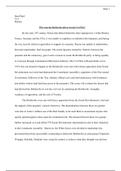Raul 1
Raul Patel
Y13
History
Why were the Bolsheviks able to win the Civil War?
By the early 20th century, Russia had fallen behind the other superpowers. Unlike Britain,
France, Germany and the USA, it was unable to capitalize on industrial development, and during
the war, heavily relied on agriculture to support its economy. Russia was unable to industrialise,
but more importantly, feed its people. The social injustice created by Tsarism; between the
peasants and the aristocracy, gave Lenin a reason to create the Bolshevik party; to bring equality
to everyone through communism (Marxism-Leninism). The Civil War in Russia broke out in
1918; this was bound to happen as the Bolsheviks were met with intense opposition from Social
Revolutionists (as Lenin had dismissed the Constituent Assembly), supporters of the Provisional
Government, followers of the Tsar, military officers (as Lenin had made peace with Germany),
and nobles (whose land had been given to the peasants). This essay will evaluate the factors that
had allowed the Bolsheviks to win the civil war by analysing the Bolsheviks’ strengths,
weakness of opposition, and the role of Trotsky.
The Bolsheviks were met with fierce opposition from the Social Revolutionists; who had
the support of the peasants’ council; Zemstvos. The dissimilarities between these two parties
were due to Lenin’s ruthless use of the Red Guards, as he used them to assassinate anyone who
openly spread negative ideas upon his communist rule. The tension between these two groups
further increased; as Lenin killed 370 Social Revolutionist representatives due to their objection
in the Constituent Assembly. Moreover, the White forces were divided in leadership; this
prevented them from successfully cooperating to defeat the Bolsheviks as each group (Yudenich,
Wrangel, Kolchak, Denikin) were vying for control, to achieve what they thought was the best





